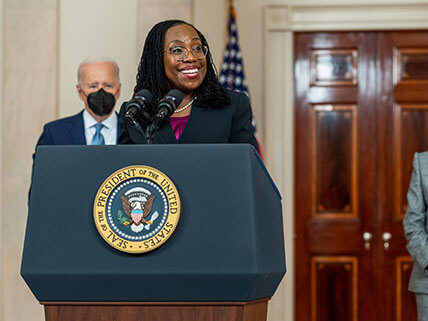
President Joe Biden and Vice President Kamala Harris look on while Judge Ketanji Brown Jackson delivers remarks on her nomination to the U.S. Supreme Court, Friday, February 25, 2022, in the Grand Foyer of the White House.
On April 7, 2022, Ketanji Brown Jackson was confirmed by a bipartisan group of Senators to become a justice of the United States Supreme Court. Jackson will be the first African American female to serve on the court, a historic milestone.
Ketanji Onyika Brown was born on September 14, 1970, in Washington, D.C. Her parents gave her the names Ketanji Onyika, which means “lovely one,” to honor the family’s African heritage. When she was a young girl, her family moved to Miami, Florida. There, she attended Miami Palmetto Senior High School, serving as class president. After high school, she attended Harvard University. There she met her husband Patrick Jackson. She graduated from Harvard Law School in 1996, and married Jackson that same year. Together they have two daughters—Talia and Leila.
After law school, Ketanji Brown Jackson went to work for Supreme Court Justice Steven Breyer. Interestingly, Jackson will be replacing Justice Breyer on the Supreme Court when he retires in the summer of 2022. In addition to working for Justice Breyer, Jackson has been a defense lawyer and a judge. Most recently, she served as a judge on the U.S. Court of Appeals in Washington, D.C. This court is considered second only to the United States Supreme Court in importance.
On February 25, 2022, President Joe Biden nominated Jackson to fill Justice Breyer’s seat on the Supreme Court. Once a person is nominated to the Supreme Court by the president, the United States Senate begins a confirmation process. During this process, the 22 members of the Senate Judiciary Committee question the nominee to determine their qualifications for the job. Those senators then vote to approve the nominee for a confirmation vote by the whole U.S. Senate.
The United States Constitution does not outline any qualifications for Supreme Court Justices, but all previous justices have been lawyers or trained in the law. The American Bar Association (ABA)–the largest lawyer’s organization in the United States—gave Jackson a “highly qualified” rating. Ultimately, the U.S. Senate agreed, voting 53 to 47 to confirm Jackson as a Supreme Court Justice.
The number of justices on the Supreme Court has changed over the years according to various acts passed by Congress, ranging from a low of five to a high of ten. The Judiciary Act of 1869 set the number of justices at nine and no changes have happened since then. Ketanji Brown Jackson will join Chief Justice John Roberts and Justices Samuel Alito, Amy Coney Barrett, Neil Gorsuch, Elena Kagan, Brett Kavanaugh, Sonia Sotomayor, and Clarence Thomas on the court. Supreme Court Justices serve for life and openings on the Supreme Court only become available if a justice retires, dies, or is impeached.
Image credit: ©Cameron Smith/White House
Sources
- The Senate Confirms Ketanji Brown Jackson
(Source: The White House; accessed April 25, 2022) - Ketanji Brown Jackson
(Source: The New York Times; accessed April 25, 2022) - The Senate confirms Ketanji Brown Jackson to the Supreme Court
(Source: NPR; accessed April 25, 2022) - Ketanji Brown Jackson confirmed to Supreme Court, making history as first Black female justice
(Source: CBS News; accessed April 25, 2022) - Ketanji Brown Jackson
(Source: Biography.com; accessed April 25, 2022) - How Ketanji Brown Jackson found a path between confrontation and compromise
(Source: The Washington Post; accessed April 25, 2022) - The Power of Ketanji Brown Jackson’s African Name
(Source: Slate; accessed April 25, 2022) - United States Court of Appeals for the District of Columbia Circuit
(Source: Wikipedia; accessed April 25, 2022) - Supreme Court of the United States FAQ
(Source: Supreme Court of the United States; accessed April 25, 2022) - How the Supreme Court confirmation process works
(Source: CNN; accessed April 25, 2022)



